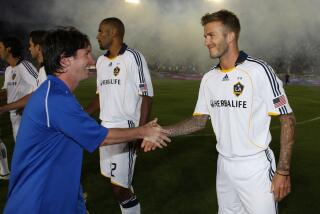PREP WEDNESDAY : Rildo: From World Cups to Kennedy’s Small World
- Share via
The soccer players on the videotape jerk forward, then backward across the screen as Rildo Menezes tries to get the tape to stop at the climactic moment. Finally, the frame freezes on one player--in green jersey No. 10--poised with his leg raised above a soccer ball.
A button is pushed, the player kicks and the ball goes into the net. Teammates swarm the scorer. No. 23 hugs him from behind and they topple together onto the field.
“You see, Pele has scored,” says Menezes. “He has tied the game!”
On the videotape the date is Oct. 1, 1977. The place is Giants Stadium in New Jersey. The event is the farewell game for the undisputed King of Soccer . . . Pele’s final appearance with the New York Cosmos in a special match against his former Brazilian club, Santos.
And No. 23 on the screen--Pele’s joyous Cosmos teammate--is Menezes. The man who operates the remote control in his home in La Mirada. The junior varsity soccer coach at Kennedy High School.
Ten years ago, Menezes was known simply as Rildo. His reputation as one of the world’s great soccer players--earned through 15 years of professional play in Brazil and three World Cup appearances--was well established.
In those days, he lived six months of each year in his native Brazil, where he was a national celebrity. The other six months he spent in Manhattan, sharing the glory of his friend Pele’s triumphant career with the Cosmos and meeting such American celebrities as Muhammad Ali and Henry Kissinger.
Today, Menezes, 46, uses his full name. He travels to Brazil for a month or six weeks each year, where he is still pursued by autograph seekers and adoring fans. But the rest of the year he makes his home in Southern California with his wife, Elizabeth, and his daughter, Monique, 3, living a life of anonymity, coaching semi-professional teams and high school kids.
“I’m out there because I enjoy soccer,” he said with a shrug. “I was captain of Santos, World Cup champion. Every team I play for has done good. What more can I want?”
A bookcase in Menezes’ living room is crowded with trophies of all shapes and sizes. Menezes points to them with pride.
“My daughter,” he said. “She won them in beauty contests.”
While Monique’s “Little Miss Beauty Contest” prizes occupy a prominent spot in his home, Menezes’ own medals and trophies are back in Brazil, in the safekeeping of his 18-year-old daughter, Samantha, who is from a previous marriage.
“He has a great ability to leave behind what he was,” said Vladimir Nieto, the varsity coach at Kennedy. “He lives in a city where no one knows his legendary past, yet he gives of himself with so much pride and dignity. He is a humble man.”
Two year’s ago, Nieto met Menezes, who was coaching a semi-professional team in Santa Monica. Nieto asked Menezes if he would be interested in coaching the junior varsity program at Kennedy. Much to Nieto’s surprise, Menezes accepted.
“Initially he did it out of friendship,” Nieto said. “He had been asked by many other clubs to come and coach.”
Now, in his second season, Menezes is helping to build the Kennedy team of the future. Last season, he turned the junior varsity team around from a 1-10-2 season the year before to a record of 8-3-4. His team (16-0-1) has given up just two goals this season.
“He is a superb role model,” Nieto said. “He is sharing his knowledge with our kids. It is like having Joe Namath coaching a high school football team.”
Menezes started playing soccer on the beaches near his hometown of Botafogo, Brazil, just outside Rio de Janeiro. He turned professional--playing left fullback--in 1961, when he was 17, joining Botafogo’s club.
For five years he played against Pele and the Santos club of Sao Paulo. But in 1967 he joined Santos, and eventually became the team captain.
He and Pele played together on the national team that qualified for the World Cup in 1962, ’66 and ’70. Brazil won the world title in 1962 and ’70.
“My memory (of those games) is so-so,” Menezes said, looking over faded newspaper clippings of himself and Pele, two young men with short hair, laughing together in practice, serious in a reception at the Vatican, playing in a game in England. “It is a very, very long time ago.”
In 1975, Menezes retired from professional soccer. But in 1977, Pele, who had been lured out of retirement in 1975--for a three-year $4.7-million contract--by the New York Cosmos of the North American Soccer League, called Menezes and urged his old teammate to join him in New York.
“Pele brought me over and said, ‘Don’t tell anyone your age,’ ” Menezes, who was 35 at the time, said. “ ‘Tell them you are 28.’ So I did.”
For two seasons, 1977 and ‘78, Menezes played fullback for the Cosmos. He was one of many world-famous players, including Germany’s Franz Beckenbauer, who attracted large crowds everywhere the Cosmos played. Pele’s ’77 farewell was played in front of almost 77,000 fans.
“It was a wonderful time,” Menezes said. “We lived in a hotel, everything was paid for. New York is the best city at nighttime, like Rio de Janeiro.”
He played for the Cosmos one year after Pele’s retirement, played a few months with the Los Angeles Aztecs in the NASL, then spent two seasons with the Los Angeles Lazers indoor soccer club. He also played for Cleveland’s indoor team before retiring for good in 1981.
Though Menezes has retired to a modest life style and his friend is still a sought-after international celebrity, Menezes and Pele see each other whenever they are in the same town.
“He is a very, very nice guy,” Menezes said. “A simple guy.”
And still the best soccer player in the world, according to Menezes.
“He is the best forever and all time,” Menezes said. “He is a level higher than Maradonna. No one will ever come close.”
At a recent Kennedy soccer match, a referee came up to Nieto and asked if the junior varsity coach used to play in Brazil. Was it Rildo?
“He couldn’t believe it was him,” Nieto laughed.
Menezes, who coaches semi-professional teams year-round (currently with the Van Nuys’ Valley Eagles), isn’t coaching at Kennedy for recognition, money or pride. For his efforts he earns about $1,100 for the season. And he does not mind taking a back seat to Nieto.
“There are young kids who wouldn’t be a JV coach for anything, just varsity or nothing,” Nieto said. “But Rildo, he thinks it’s more important to give better coaching at the younger level.”
Menezes thinks he is making an impact with his players.
“I like that age because they want to learn,” he said. “In Brazil, they would think they already (are) so good. Here, they try to do what you want. They are proud (of me) and they try to play good soccer for me.”
Sophomore Tony Lidyard said: “It’s like getting a really expensive soccer coach for free.”
Menezes said he tries to teach his team Brazilian style soccer, controlling the ball and keeping it on the ground rather than up in the air. Though Menezes is more comfortable in his native Portuguese or Spanish than speaking English, his team understands him.
“I show them what I want,” Menezes said. “They have so many coaches who can’t show them, who just look in a book. But I can tell them more by showing them. I have played on the field.”






